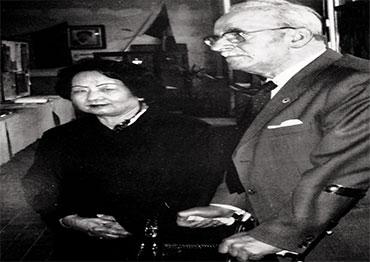Most literature about Qian focuses on her heroism. Xu interviewed many of her relatives and acquaintances to present a more nuanced portrait.
“She has the traditional Chinese feelings of home and country. Yixing, south of the Yangtze River, where she was born, is one of the earliest forward-thinking counties in China,” Xu said.
Qian Xiuling was the fourth of five siblings. Her father Qian Xixun was liberal and opened a free school in the village in Jiangsu Province. All his children received a good education and Qian Xixun hired private tutors for them.
Qian Xiuling read stories about physicist Marie Curie in a pictorial newspaper and looked on her as an idol. After many attempts, her father agreed to send her to a new school in Jiangsu Province, and then one in Shanghai. At the age of 17, Qian went to Belgium to study chemistry at the University of Leuven.
While her father was liberal when it came to the education of girls, he had still betrothed her in marriage when she was just 3 years old. Her fiancé was also studying in Belgium. But after Qian Xiuling met him for the first time, she found she did not like him. She wrote to her father, hoping to get out of the arranged marriage. Her father was furious and cut off support for her tuition and living expenses.
Later, Qian obtained a Chinese government scholarship and was able to continue her studies in Belgium. At the age of 22, Qian received two doctorates in physics and chemistry. It was at Leuven that Qian met her future husband.
In a street near the university, Qian saw Gregoire de Perlinghi trying to resuscitate an elderly man who had collapsed. By the time she pushed through the crowd, the man was already conscious, and she called a carriage for him.
The next day, Qian read in the school bulletin about her future husband’s deeds. He was then a third-year medical school student at the University of Leuven. The two gradually fell in love.
After graduation, Qian worked as an assistant professor at the university. She had planned to return to China with her husband in 1937, but the Japanese had launched an all-out invasion of China. The couple stayed in Belgium and set up their clinic. They went on to have five children.
After WWII, Qian resumed her work at Leuven University and the United Nations Institute of Nuclear Sciences. She departed from scientific research after getting pregnant again.
Later, Qian ran three Chinese restaurants in Belgium. Her husband died in 1966, but after China’s reform and opening-up in the late 1970s, she traveled to China twice to visit relatives.
Whenever people mentioned her heroics in saving people, she was always modest in reply. For years, none of her relatives in the Chinese mainland knew about her deeds in Belgium.
Unassuming to the last, Qian had requested a simple funeral, but her coffin was draped with a Belgian flag, and survivors of Belgium’s resistance to the Nazis came to pay their respects and lay flowers.
Qian’s last words were “forget me.”

 Old Version
Old Version

